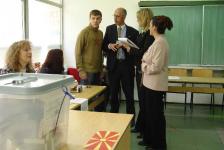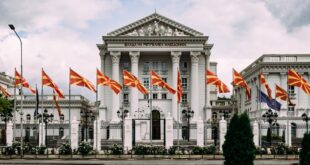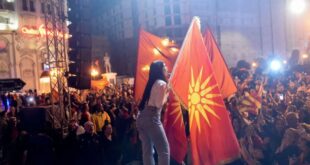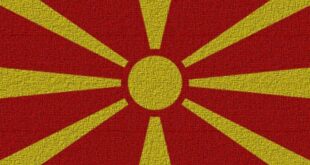 George Ivanov from the main ruling VMRO DPMNE party maintains a lead according to early results from Macedonia’s Presidential election although he is likely to face a run-off vote in two weeks time.
George Ivanov from the main ruling VMRO DPMNE party maintains a lead according to early results from Macedonia’s Presidential election although he is likely to face a run-off vote in two weeks time.
Out of 98 percent of the counted votes, Ivanov is the frontrunner with about 340,000 votes or 35 percent while Ljubomir Frckoski from the main opposition the Social Democrats has won 198,000 votes or just over 20 percent, according to the State Election Commission’s latest data.
The ruling party celebrated the victory on Sunday night while the Social Democrats argued it won more votes than last year’s staggering defeat at the general polls in June and that the vote marked the start of the “awakening” of the people against the politics of VMRO, which they claim has led the country into isolation and economic stalemate.
The independent candidate Ljube Boskoski, acquitted at The Hague tribunal of war crimes during the 2001 Macedonia conflict last year and Imer Selmani from the New Democracy party both tallied around 145,000 votes or about 15 percent each.
Agron Buxhaku from the ruling Democratic Union for Integration, DUI got 73,000 votes or just under 7.5 percent while Nano Ruzin from the Liberal Democrats won around 39,000 votes or about 4 percent.
Mirushe Hoxha from the Democratic Party of Albanians, DPA got about 30,000 votes or around 3 percent.
Earlier the State Election Commission announced Sunday’s presidential and mayoral elections went without major incident and met democratic norms.
In what was widely seen as a curtain test for the country’s shaken democratic record only the heavy snow disrupted the election with ballot materials unable to reach some remote mountainous areas on time.
But overall the election went “peacefully and in a democratic atmosphere with minor exceptions,” the State Election Commission head, Aleksandar Novakovski said at a press conference.
The snow prevented some 12,000 people in certain mountainous villages, less than one percent of the total voters, to vote as the balloting did not start in 103 out of the nearly 3000 ballot stations, the commission said.
The largest association of domestic monitors, MOST also assessed the vote as generally fair and democratic with few minor, mainly technical and administrative flaws. They have been monitoring the process with over 3000 observers out of almost 7,500 present at the ballots. The police presence was also evident at all ballot stations.
The election is being closely monitored in the West which has previously warned the country that it could face years of delay in its bid to join the European Union if there is a repeat of last year’s election-related violence. In June 2008, violence erupted between rival ethnic Albanian parties during the vote leaving one person dead and several wounded.
In statements given prior to the closing of the vote, the Organization for Security and Cooperation in Europe, the largest international monitoring group, and the key western ambassadors to the country also expressed that they were content with the way the elections were held.
Macedonia could have a “Snow White Election”, the EU ambassador to the country, Erwan Fouere said optimistically during his monitoring to the ballot posts.
If none of the seven presidential candidates wins more than half of the votes in the first round a run-off will be staged on April 5 between the two front-runners. The same applies for the 84 mayoral seats.
During the campaign, the opinion polls favoured Ivanov. Frckoski and Selmani were mentioned as most probable runner-ups.
If the country pulls off a smooth election it can hope for a swift removal of EU visas put up against travelling Macedonian citizens and a date for the start of its EU accession talks this autumn.
Macedonia has been a EU candidate state since 2005 and last year the EC said Skopje is still not ready for the start of accession talks largely because the violence and fraud allegations that marred the 2008 general election.
 Eurasia Press & News
Eurasia Press & News



